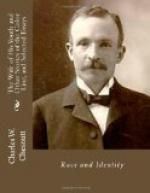She scaled the fence, caught up the basket of peas from where she had left it, and ran, lightly and swiftly as a deer, toward the house. Her short skirt did not impede her progress, and in a few minutes she had covered the half mile and was at the cabin door, a slight heaving of her full and yet youthful breast being the only sign of any unusual exertion.
Her story was told in a moment. The old woman took down a black bottle from a high shelf, and set out with Cicely across the cornfield, toward the wounded man.
As they went through the corn Cicely recalled part of her dream. She had dreamed that under some strange circumstances—what they had been was still obscure—she had met a young man—a young man whiter than she and yet not all white—and that he had loved her and courted her and married her. Her dream had been all the sweeter because in it she had first tasted the sweetness of love, and she had not recalled it before because only in her dream had she known or thought of love as something supremely desirable.
With the memory of her dream, however, her fears revived. Dreams were solemn things. To Cicely the fabric of a vision was by no means baseless. Her trouble arose from her not being able to recall, though she was well versed in dream-lore, just what event was foreshadowed by a dream of finding a wounded man. If the wounded man were of her own race, her dream would thus far have been realized, and having met the young man, the other joys might be expected to follow. If he should turn out to be a white man, then her dream was clearly one of the kind that go by contraries, and she could expect only sorrow and trouble and pain as the proper sequences of this fateful discovery.
II
The two women reached the fence that separated the cornfield from the pine woods.
“How is I gwine ter git ovuh dat fence, chile?” asked the old woman.
“Wait a minute, granny,” said Cicely; “I ’ll take it down.”
It was only an eight-rail fence, and it was a matter of but a few minutes for the girl to lift down and lay to either side the ends of the rails that formed one of the angles. This done, the old woman easily stepped across the remaining two or three rails. It was only a moment before they stood by the wounded man. He was lying still, breathing regularly, and seemingly asleep.
“What is he, granny,” asked the girl anxiously, “a w’ite man, or not?”
Old Dinah pushed back the matted hair from the wounded man’s brow, and looked at the skin beneath. It was fairer there, but yet of a decided brown. She raised his hand, pushed back the tattered sleeve from his wrist, and then she laid his hand down gently.
“Mos’ lackly he ‘s a mulatter man f’om up de country somewhar. He don’ look lack dese yer niggers roun’ yere, ner yet lack a w’ite man. But de po’ boy’s in a bad fix, w’ateber he is, an’ I ’spec’s we bettah do w’at we kin fer ‘im, an’ w’en he comes to he ’ll tell us w’at he is—er w’at he calls hisse’f. Hol’ ‘is head up, chile, an’ I ‘ll po’ a drop er dis yer liquor down his th’oat; dat ’ll bring ’im to quicker ’n anything e’se I knows.”




